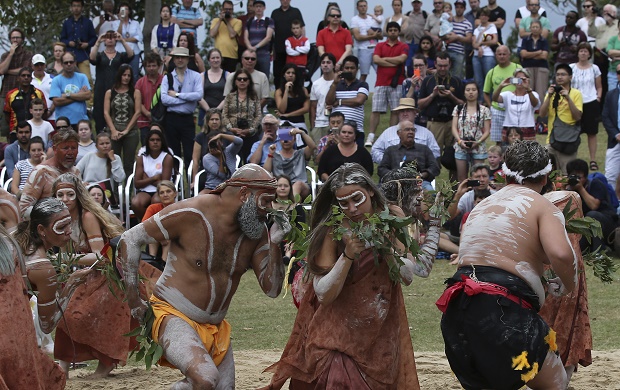Australia struggling to improve lives of Aborigines—PM

Traditional Aboriginal dancers perform a ceremony on Australia Day in Sydney, Australia, Tuesday, Jan. 26, 2016. Australia Day is the anniversary of the arrival and landing of the First Fleet of convict ships from Great Britain, and the raising of the Union Jack at Sydney Cove by Captain Arthur Phillip, on Jan 26, 1788. AP Photo
SYDNEY, Australia—Australia is making only limited progress in meeting targets to improve the life expectancy, education and employment of Aboriginal people, Prime Minister Malcolm Turnbull said Wednesday, while drug abuse, violence and imprisonment levels remain serious problems.
Aborigines have lived on the vast island continent for at least 40,000 years and number just 470,000 out of a total population of 23 million. They have long had significantly lower education, employment and life expectancy compared to non-indigenous communities.
In a bid to tackle the stark differences, the government introduced an annual “Closing the Gap” report in 2009, which was released again on Wednesday.
Turnbull hailed progress towards achieving some targets, including a goal to halve the gap in child mortality by 2018, improvements in narrowing the divide in reading and numeracy, and an increase in the proportion of students completing high school.
But noting that the life expectancy gap remained “unacceptably wide,” Turnbull said there was an enormous task ahead, with “real and difficult challenges… particularly in isolated communities.”
Article continues after this advertisementLife expectancy for non-indigenous males was 79.7 years compared to 69.1 for Aborigines in 2010-12, according to official data released in 2013.
Article continues after this advertisementFor females, it was 83.1 for the non-indigenous population, in contrast to 73.7 for Aboriginal people, with a small reduction in the gap of 0.8 years for men and 0.1 years for women between 2005-07 and 2010-12.
Turnbull 27 percent of the prison population, with the adult incarceration rate rising.
He said drug and alcohol abuse was a key problem.
“We must be honest about the catastrophe and violence created by drug and alcohol misuse and confront and respond to the cries for help, particularly from women and children,” he said in an address to parliament in Canberra.
Turnbull stressed that working with indigenous communities across the country to develop local policies and solutions was key to bridging the gap, an approach emphasized by both supporters and critics of the yearly report.
“We have heard these words before,” said Aboriginal and Torres Strait Islander said that while indigenous people made up only three percent of the nation’s population, they represented 27 percent of the prison population, with the adult incarceration rate rising.
He said drug and alcohol abuse was a key problem.
“We must be honest about the catastrophe and violence created by drug and alcohol misuse and confront and respond to the cries for help, particularly from women and children,” he said in an address to parliament in Canberra.
Turnbull stressed that working with indigenous communities across the country to develop local policies and solutions was key to bridging the gap, an approach emphasized by both supporters and critics of the yearly report.
“We have heard these words before,” said Aboriginal and Torres Strait Islander Social Justice Commissioner Mick Gooda, who is the “Closing the Gap” campaign co-chair.
“We take them with good heart but there’s got to be a carrying-out of that new relationship so I think we’re entitled to be a little bit cynical about it until it starts happening.”
RELATED STORIES
‘Racist’ video game pulled after uproar over killing Australia Aborigines